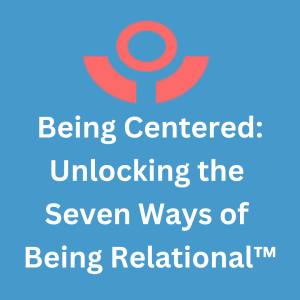 Being Centered is fundamental to The Relational Approach ©, pioneered by Louise and Bill Senft through their mediation work over the past 30 years at Baltimore Mediation. Being centered is one piece of the puzzle of promoting quality dialog. The Relational Approach is not a linear process, but rather one that holds being engaged, being centered, grounded and clear all at the same time. Have you had the experience of feeling in harmony with others and within yourself? That is the essence of being centered. As a reminder, the Relational Mindset focuses on interactions that are natural and authentically oriented to connection with others, which empower and bring joy to you and others.
Being Centered is fundamental to The Relational Approach ©, pioneered by Louise and Bill Senft through their mediation work over the past 30 years at Baltimore Mediation. Being centered is one piece of the puzzle of promoting quality dialog. The Relational Approach is not a linear process, but rather one that holds being engaged, being centered, grounded and clear all at the same time. Have you had the experience of feeling in harmony with others and within yourself? That is the essence of being centered. As a reminder, the Relational Mindset focuses on interactions that are natural and authentically oriented to connection with others, which empower and bring joy to you and others.
What it feels like to be Centered
The feeling of harmony with others and within yourself is both within you, in your center, and around you in how you are with others. That feeling of being centered is a resource. Remember that feeling! Finding your center really begins with your body and your brain. I experience this “zone” in my transformative mediation work. I’m aware in the moment, as well as on a meta level, and able to see what is unfolding as if from above and am still able to surgically intervene at the same time in a way that parts the sea for clients, out of which emerges for them something unexpected, something intuitive, something said in the perfect meaningful way.
Nothing is quite so identified with the center of your being as your heart. When you are centered, your heart is calm, peaceful, strong, wise and expansive. Your heart will tell you when you are not centered. In conflict, you have an experience that is mental, emotional, and physical. The likelihood of your brain being hijacked in conflict is high and your ability to listen deeply and reflect, let alone your ability to be open to another when in a state of conflict is decreased dramatically.
Becoming aware of your reactions
As a physiological reality, it is very difficult to remain centered when your reactivity is triggered. But you can do it. Here’s a scenario to illustrate this point. Imagine yourself in a checkout line; you are in a bit of a hurry. Behind you, a mother is yelling at her crying 2 year old to behave. As she screams, you are aware this makes you feel uncomfortable. You may feeling embarrassed for her, judgmental or recalling incidents in your own life that are uncomfortably close. Aware of these thoughts, you take a breath. Fill your whole tank with fresh oxygen, a deep belly breath, and then exhale the energy attached to the thoughts, memories and triggers. Come back to center, to calm in the face of this storm. Your awareness of what is going on in your mind and in your body is the key starting point. Then, coming from a place of center, you might turn to the mother and say “Some days are hard with kids. Please take my place in line.” Being centered helped you to be relational by offering kindness.
Important learning: In the example above, your response from a place of center provides the pause for that mother where she might regain some oxygen for herself. And interacting in a relational way contributes to well-being for both you and the system. As for the mother, on the spot, she must meet her own strong emotions with a practiced skill of deep listening and reflecting. She could soothe her emotional reactions with deep calming breaths, which would also have a calming effect on her child. That calming distance can create a pause to consider the options. Relational negotiation begins with being centered. Engaged from a place of center creates well-being – relational reciprocity.
In Being RelationalTM, the first Four Ways of Being Relational, Being Engaged, Being Centered, Being Grounded and Being Clear, lead to quality dialogue and tend not to escalate conflict in an unhealthy way and are based in the relational theory of conflict on which Baltimore Mediation has based its work.
Try it at home: Much of being centered comes from the ability to calm the body, namely to calm your primitively instinctual monkey mind and your racing heart. One of the most ancient ways of doing so is by concentrating on your breath. This month, focus on how conflict feels – and your reactions. When an emotional overload begins, especially in conflict, concentrate on your breath and the flow of oxygen into your body.
Being Centered is being aware of your reactions and getting into the “flow” with your mind, body and heart. Next month in the Gazette, you can look forward to additional examples of Being Centered, including how to avoid Triangulating in your relationships. Learn more about this worldview in our book, Being Relational